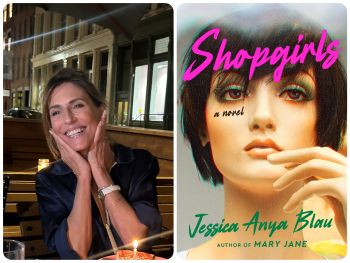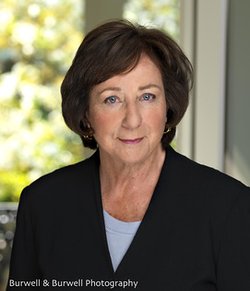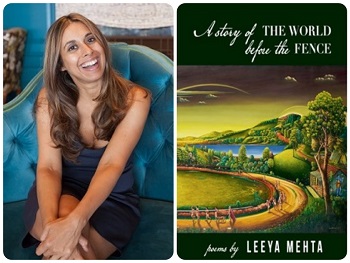The novelist talks cosmetics ladies, male leads, and thinly veiled fiction.

I first met Jessica Anya Blau in the shower. We were attending the same party and, like houseguests from your worst nightmare, she and I were snooping. When I went to check out the master bathroom, I opened the shower curtain, and there she was, checking out the tiles. “I’m redesigning my bathroom,” she told me. (I had no such excuse.)
It turned out that Jessica was the author of my favorite book, The Summer of Naked Swim Parties, a funny and tender story about the straitlaced daughter of hippie parents who’s on the verge of womanhood. I’ll say it now: No one does on-the-cusp stories better than Jessica.
She’s at it again with Shopgirls, her sixth novel, which stars 19-year-old Zippy, the newest and youngest salesgirl at I. Magnin. Amid a cast that includes her ambitious and boy-crazy roommate, her mother, her mother’s boyfriend (who slices off four of his fingers in a way I won’t spoil here), and a band of glamorous, conniving, and downright mean fellow salesgirls, Zippy yearns for a better life. (As anyone who’s ever worked retail knows, she’s about to be guaranteed a more interesting one, no matter how many Andrea Jovine dresses she sells on commission.)
Set against the shoulder-padded silhouettes of the 1980s, Shopgirls is both a trip down memory lane and a deeply moving look at family — both biological and found.
We both went through retail training programs — you at I. Magnin and me at Bloomingdale’s — so I recognized so much of my job in your writing about Zippy’s job. (We even sold the same lines of clothing!) I’m wondering how many of your saleswomen are based on your actual coworkers. Like, did one of your salespeople go into a fitting room to pray for customers? Or was there one who could never figure out how to close out the register for the day?
It’s all true. One did go in the fitting room and pray, one cried often because she couldn’t close out her register, one had a giant candy ball in her mouth at all times and was mean — they’re all real. There were more of them, too, but because there were too many characters to follow in a book, I had to eliminate a few.
Along those lines, you often mine your own life for your fiction. In Drinking Closer to Home, you even allowed your family, on whom so many of your characters were based, to give their two cents in the final section of the book (and you included photos of them!). Do your friends try and find themselves in your work?
It’s funny how people (and I’ll include myself in any generalization) often don’t see themselves the way others do. So, though I do use some friends as the launching point for a character, no one’s ever pointed it out. People have said things to me that I’ve written down and then used in books, and I have been called out on that. I never deny it and always extend my HUGE thanks because I am thankful! I am grateful to be surrounded by so many fascinating people who sometimes say hilarious things. The advice the cosmetics ladies give Zippy in Shopgirls is all advice I was given.
Which leads me to: Since so much of your writing is autobiographical, why not write a memoir?
First of all, no one would be interested in reading about MOI! There’s nothing special about me that merits a memoir. I did exploit my family and childhood in Drinking Closer to Home, and 90 percent of that book is true. The great thing about fiction is you can manipulate time and sequence in order to increase tension and make things more interesting. So, in Drinking, everything that happened in the Fire Island chapter (as one example) actually happened. But in real life, it didn’t happen the same year, and most of it didn’t happen at Fire Island.
Your novels always star young women. Have you considered casting a male lead and writing a story from his POV? It’s not like you don’t excel at writing male characters (I’m thinking about the doctor and rockstar in Mary Jane).
I’ve written short stories from a man’s point of view. A novel would be fun. I might try it!
You’ve ghostwritten a lot of books. Did any of their authors lead a life similar to yours, and if so, did that make things harder?
Because they’re ghosted, I’m not allowed to say that I had anything to do with them. The only one I can discuss is The Unexpected Spy, which is a memoir by a CIA undercover operative who was recruited out of her sorority at USC and sent overseas undercover. Her name is Tracy Walder and she’s an amazing woman and was an absolute joy to work with. It was a true collaboration, and she insisted that my name go with hers on the book. None of the ghost people I worked with lived lives similar to mine, but Tracy grew up in Southern California, as I did, and we had a few other things in common. What she did to merit a memoir is…well, she saved all our lives, though the details to how she did that were redacted by the CIA.
The thing that makes ghostwriting hard is ego…trying to convince people to let go of their ego and be real so that the reader can connect to them. The people who are easy to work with are the ones who aren’t ego-driven. I love working with people who are willing to be vulnerable and real.
[Photo by Ella Blau.]
[Editor’s note: Jessica Anya Blau will discuss Shopgirls at the Ivy Bookshop in Baltimore on Friday, June 6th, at 6 p.m. Learn more here.]
Cathy Alter is a member of the Independent’s board of directors and the author, most recently, of CRUSH: Writers Reflect on Love, Longing, and the Power of Their First Celebrity Crush.

